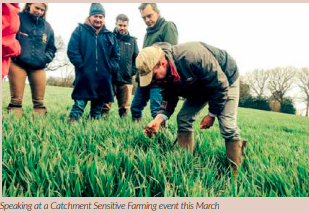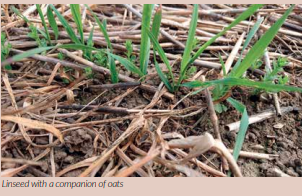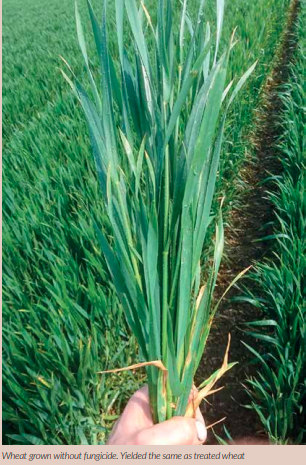Farming in Transition

This year on our farm we have used no tillage, 40% less Nitrogen fertiliser than standard practice, over 50% less fungicides and only one insecticide on a 3ha field of Spring linseed. Has getting to this stage been easy? No. Has it all gone perfectly? Definitely not.
It has been a hard road we have taken to get to this stage over the last 18 years with many lessons learnt and many more lessons to come. Transition is difficult and you must be prepared to fail. When I visited Gabe Brown in North Dakota he said, “if he didn’t fail at least once a year he wasn’t trying hard enough!” When we started reducing tillage in 2001 there weren’t many people to advise us. The same was true when we grew our first cover crop a few years later and now we are reducing inputs there are very few people to advise us.
So, we had some glorious failures, this though now can be avoided as there is much more information out there now, as long as you speak to the right people. I think practising farmers are the best option. So why are we going through this transition? For me there are a few choices going forward into the future. We go for a high input/ high output system and probably fail on the high output part most years! We can go organic, I have had the pleasure of visiting many great organic farmers, but the system is currently not for me due to too much cultivation, potentially high weed burdens and large yield variation.
On my Farm I believe the best economic and environmental route is a hybrid system of the two.

Judicious use of pesticides and fertilisers with the aim of reducing their use year on year by using cultural and Agroecological methods. This will hopefully maintain yields but at the same time reduce cost per tonne produced, reducing the farms exposure to weather and market variations. There are a few other reasons why I am choosing the low input system over the high input system: firstly, I don’t believe we have a choice. Consumers, climate change activists, water companies, The Environment Agency and many others are demanding produce that is grown with less fertiliser and “cides”, these demands are getting louder.
The current drive to high input/high output cereal farming will I believe become uneconomical, possibly illegal, if the polluter pays principal is applied. Secondly the chemical tools in our armoury are quickly being removed and the ones left have increasing resistance to them, alternatives methods must be found. Finally farming this way is far more interesting. The conventional way of farming hides many issues with plant and soil health by covering them with fungicides and applying excess amounts of fertiliser. It is not until you reduce or remove their use that you start to see differences in terms of plant health between fields and within fields, then you need to try to work out the root cause of the differences.
An example of this, this year, our only areas of wheat affected by BYDV are on the sandy soil which became Manganese deficient in January, which then made the wheat attractive to aphids. So next year we will have to improve nutritional management on the lighter ground. Interestingly these same areas are the only place we have seen excessive disease in the wheat, no wheat had a fungicide until flag leaf. I personally think the deficiency of Manganese led to BYDV which then stressed the plant allowing disease to enter the crop.

I seem to spend a lot of my time being told by people that what I am doing is not possible. Most magazines you read will tell you of the impending disaster if you dare omit a pass with a chemical. If it wasn’t for my experiences on my Nuffield Scholarship, seeing amazing farmers around the world who have drastically reduce inputs while maintaining or increasing their yields, I may have had doubts and returned to the standard current practices. What did they all have in common? Diversity of cropping and a whole farm systems approach. There is no way I am going back now!

The major advantage of the standard practices is that it’s easy. Your agronomist gives a recommendation, you send out the sprayer to carry out the orders and you don’t even need to enter the field. This is not true of a low input regenerative system of farming. You need to be out there regularly checking your crops, observing differences, digging holes and sometimes have big balls to say no to your agronomist. Every year is different, standard “T” timings and products do not cut it. Achieving a successful low input system starts with the soil. A healthy soil grows a healthy plant which in turn needs less fertiliser and is more resilient to pest and diseases.
This whole farm systems approach is knowledge intensive not input intensive. You need diversity and need to be flexible, if you think you can just cut out inputs and all be fine you could get a shock. Adding diversity to our cropping for me is the most important strategy we need utilise more going forward. This year we have used oats as a companion crop for spring linseed, as I observed last year that the linseed growing in wild oat patches were less affected by Flax Flea Beetle. The Innovative Farmers trial here has shown that where linseed was planted with the oats, we have about 80-100 more plants per m2 survive the Flea Beetle onslaught compared to the monocrop Linseed. A great example of Diversity in action.
Unlike organic farming this reduced input approach doesn’t receive transitional payments or receive a premium for your produce and so for it to work costs need to be reduced and good advice needs to be taken, especially in the early years to avoid the big mistakes that we have made here on our farm. An issue with the whole farm systems approach is that it is complicated so their needs to be an understanding of the knock-on effects of each decision. During the last couple of years of travelling the country and talking at farming events I have noticed a real growing interest in reduced input farming. I was getting many questions on Notill, cover crops, intercropping and input reduction strategies so I thought there was an information gap that needed to be filled.
Like most farmers they prefer to listen from other farmers and learn from their successes and failures rather than experts with no skin in the game who can be driven by other vested interests and agendas. As a result, I have joined Abacus Agriculture as a consultant. Abacus are a group of independent consultants and farmers, who advise on transitioning to organic farming, agroforestry and soil management. Adding myself to the group seemed to make obvious sense, we are all advising on transitioning in farming and have much we can learn from each other. So if you think you want to start this transition take a look at our transition tool by scanning the QR Code.

Join the growing group of farmers leading the way to a sustainable farming future and making farming exciting again!
